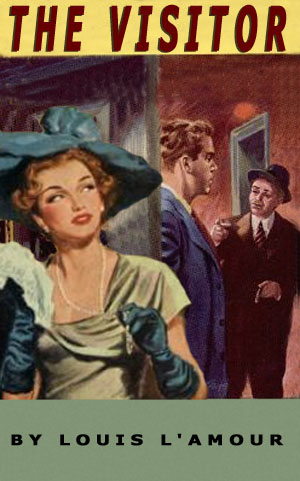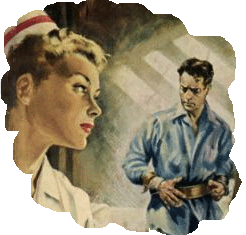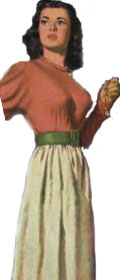"Ruth Carter felt suddenly faint. She turned her head and the bright blue eyes were intent now. Her brother, George. How could he...how could anybody...'George? You know...George?' " . . .
BEAU L'AMOUR'S COMMENTS: This was intended to be a dark comedy of manners like "The Lady Killers" or "To Sleep With Anger." A uptight and righteous middle class family, worried about their position in the society of their town, reluctantly takes in a visitor who proceeds to make them all so embarrassed, and fearful that they begin plotting to murder him. I have heard rumors that Dad had actually finished this story but this fragment is all I have ever found.

When she opened the door he was standing there smiling, a man slightly below medium height with a square pink and white face and a small blonde Hitler type mustache. His eyes were pale blue and protruded somewhat, but he was very neatly dressed in a gray suit. His hat was perched squarely atop his head, and looked as if it were a size too small.
"Is your mother in Elise?" he asked. "I would like to speak to her."
Elise was puzzled for she had never seen him before and could not guess how he knew her name. "Why, yes, I believe so." Rather hesitantly, she stepped back. "Won't you come in?"
He took a chair in the living room and sat there with his hat on his knees, sitting very straight, his blonde hair parted neatly, and his blue eyes owlish. "Tell her it's Mr. Ambrose," he said.
Mrs. Carter came into the living room looking faintly puzzled. "You wished to see me?" she asked. Elise had disappeared somewhere in the back of the house.
"Why, I was looking for a room. A place to stay. This house looks very nice, and so comfortable. I am sure I will like it here."
Mrs. Carter smiled, rather relieved for the man disturbed her. "Oh, I'm afraid there's been some mistake!" she said. "We don't let rooms!"
"You could let me have Jack's room," he said, "now that he is away in the Army he won't be using it."
"You know Jack?" Mrs. Carter smiled, sensing this was the explanation. Mr. Ambrose had made no move to rise.
"Oh no! I never knew Jack. That is," he looked up at Mrs. Carter, "only as I know all of you."
"All of us?" She was sure now that the man must be slightly off balance, and was wondering what she had better do. If Dick were only here....
"Yes, all of you." He moved his hat a little in his fingers. "You, Richard Carter who is your husband, your son Jack, your daughters Elise, Armorel and Ann...and then, of course, your brother George."

Ruth Carter felt suddenly faint. She turned her head and the bright blue eyes were intent now. Her brother, George. How could he ... how could anybody ... "George? You know ... George?"
"Oh, yes! Yes, I know George. At least, I know all about him. But don't worry, I don't intend to tell anybody, not anybody at all! Of course," he smiled deprecatingly, "sometimes I do talk more than I should! When I am among friendly people...well, you know how it is! Perhaps one does talk more than one really should."
Ruth Carter sat very still, staring out the window. Her thoughts were all confusion and from them she could find no escape. Was it a threat? After all, suppose he did tell? The instant that occurred to her everything in her rose to rebel against the possibility. Her brother a common criminal! Think what people would say! Why, Mrs. Knight would ... one by one their faces passed in review before her mind and the thought of all the town would say. She could almost hear them ... "Yes, I mean it! Mrs. Carter! Well, I always did say there was something funny there! And she so high nosed about everything!"
Ruth Carter's face was pale. With difficulty she brought her thoughts back to the room in which she sat. "Whatever would I tell my husband?" she demanded. "Why, I ... !"
"It would be very simple," Mr. Ambrose was calm, "tell him I dropped by to say hello, that I am an old friend of your Aunt Mary's."
So he knew about her, too! For an instant she looked into the pale blue eyes opposite her and fright mounted within her. Who was he? How could he have learned all these things? Where did he come from? Still, why not keep him here a few days? Then they could get him safely out of town, and ...
"Mother! Oh, mother!" It was Elise. "Can I take the car? I want to see Bess. I'll be right back!"
When she saw Mr. Ambrose she stopped still, and Ruth Carter turned quickly toward her, glad for an excuse to think about something else. "Yes, take the car, but don't be gone long." Then she said, "Elise, this is Mr. Ambrose, a friend of your Aunt Mary's. He will be with us tonight."
Mr. Ambrose cleared his throat. "I may have to stay a little longer ...?"
"Oh, of course! That will be perfectly all right. Now if you'll come with me, I'll show you to your room."
Mr. Ambrose got up. "I'll call the station for my bags," he said, "when I come down." Then he turned suddenly to Elise. "Or would you mind? The station isn't far. When you come back, would you take this key and bring me the bags out of the locker at the station? Thank you."
 Leaving Elise staring at the key in her hand, he turned to Ruth Carter. "Shall we go?"
Leaving Elise staring at the key in her hand, he turned to Ruth Carter. "Shall we go?"
For one long instant Ruth Carter stood still. It was in her mind to refuse. To tell him to go. To tell him to say what he would about her brother, yet even as she started to turn she thought again of Mrs. Knight ... and then she thought of Ann's approaching marriage to Lester Corey, of Corey Park. Once the story of her brother George got out, that would be ended, and Ann was deeply and sincerely in love with Lester. It wasn't only that he was the best catch, but he was a fine boy. Still, his family would never consider allowing him to marry into the family of a jail bird.
Her face stiff, her mind blank, she led the way up the stairs. The room was pleasant, and he glanced around with approval. "Yes, I'll like this," he said, "I'll really enjoy it. Although," he added, "I'd really have preferred Ann's room ... it's larger."
"You seem to know a good deal about our home," Mrs. Carter said, her voice sounding strange and tight.
"I do." He turned now and smiled at her. "I studied the plan of it before I decided to live here."
Live here? The words ran themselves over in Ruth's mind several times before they registered. Stricken with horror, she turned on him. "But I didn't mean for you to live here!" she said. "This was only for a day, perhaps two or three! Why, it would be utterly preposterous! I wouldn't think ...!"
"I would." He interrupted her. "I would, and in fact I've thought about it a great deal. I looked over several families before I decided where I wanted to live, but with George and your Aunt Mary and her escapades...did you realize that she was a nymphomaniac? Oh, no! This is much the best place for me to stay!"
"No!" Ruth Carter was beside herself. "Get out of this house this instant! Do you hear? If you don't I'll ... I'll call my husband!"
"You needn't," Mr. Ambrose said, "he'll be home soon. Then you can send him to me. Until then, if you don't mind, I'd like to be alone ... and incidentally, I don't like the bath towel. I like them much larger."
Dazed, Ruth Carter walked to the door and drew it shut after her. Like a sleep walker she went down the hall, and then down the steps. What had happened? It was like a horrible nightmare, some story heard on the radio! It couldn't be true! It simply couldn't!
Yet it was true. Wide eyed and cold with fear she stared out the window. He had said he had studied them before deciding where to come, that he had examined the floor plans of the house, that he knew about George and Aunt Mary...it wasn't as if Aunt Mary was bad, she was simply careless. She had too many men friends without benefit of clergy. Actually, it was no worse than some of these women who marry five or six times. Yet she knew what her friends would think, and Aunt Mary was fit topic for dozens of conversations at the clubs and the meeting of the Homemakers.
- End of Fragment -
BEAU'S ADITIONAL COMMENTS: There were a couple of versions of this story, but this was the most complete. In some of Dad's notes and correspondence, he has indicated that his eventual intention was to make Mr. Ambrose somewhat less menacing, at least at first. In those versions of the story the man would have been a distant relative, or possibly someone who had spent some time in an asylum with a relative. Rather than putting him off and then being blackmailed he would have initially been welcomed but as his talent for trouble-making and his potential to upset the family's social position became more and more obvious they would begin to plot his murder.

